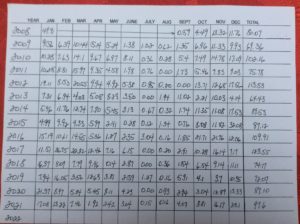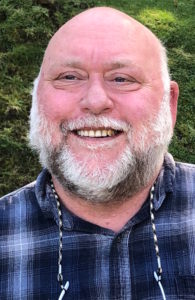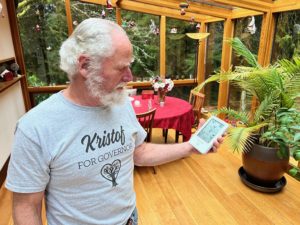
By QUINTON SMITH/YachatsNews.com
Jim Adler began building his house and metal shop on a steep hillside three miles up the Yachats River 46 years ago and for the last 14 years has been painstakingly measuring and recording rainfall each day.
What he writes down is an important record for Yachats’ 1,000 residents and the thousands of tourists who flock to the coast each summer because his 10 acres of land sits near one of the city’s main sources of water – Reedy Creek.
The valleys and hills above the central Oregon coast soak up winter rains like a giant sponge. What doesn’t run off is stored in the ground and released into springs and small creeks that flow west – and into the small water systems that feed municipal water systems from Yachats to Seal Rock.
On their daily walks this winter, Adler and his wife, Ursula, have seen seasonal springs on their property releasing water months before they usually do.
“When they come up earlier than expected, that’s good news,” he said.

That’s because 2021 – despite two summer months with no rain — was very wet overall, pushed by downpours in November and December.
“We dried out big time this summer,” Adler said. “Then came the winter and the second-wettest December since I started keeping records.”
Adler measured 23.1 inches of rain in December and 97.6 inches for all of 2021 – almost 6 inches higher than his 10-year average. His 2021 rain total was the fourth-highest in the last 10 years.
His measurements were substantially higher than the 64.81 inches of rain recorded at the Yachats wastewater treatment plant in 2021. The city’s 2021 total was 5 inches below its 10-year average.
Bob Williams lives 10 miles upriver, has been keeping rain records for four years and communicates regularly with Adler on their measurements. Williams measured 25.65 inches in December and 117.56 inches for the year – almost two feet more than Adler and more than four feet higher than the city’s.
Donald Tucker, chair of the Southwest Lincoln County Water PUD, has been measuring rain at his house just off Highway 101 two miles north of Yachats since 2007. He recorded 16.65 inches of rain in December and 75.25 inches for all of 2021. It was the second wettest December for Tucker in 15 years and his 2021 total is exactly his average the past 10 years.
But when it comes to water supplies for the city of Yachats, what falls in the Yachats River valley is much more important than the amount that falls in the city.
In addition, city of Yachats’ water supervisor Rick McClung said upriver rainfall in the late spring is currently the key to ensuring adequate water in the city during the summer.
“What rally matters for us is the late season rains before the sponge dries out,” he said. “May to October with little rain is a long stretch.”

Storage, not supply issues
But as water watchers and experts along the coastal rain forest continually say, when it comes to serving residents and visitors the area doesn’t necessarily have a supply problem, it has a storage problem.
“We you get eight feet of rain a year but there’s no water in the summer … that’s an issue,” Adler said.
The city of Yachats has been struggling with that issue for years, even while adding a 250,000-gallon tank for treated water in 2018 and approving a 20-year water master plan last year. But gaps in city management, a struggling city council and non-functioning finance or capital improvement committees have meant no progress on “water security” issues that the city continually ranks highest on its list of priorities.
The Yachats council is now proposing to streamline the finance/capital improvement committee to help prioritize projects and their funding. But it is not clear whether enough can be done during the last six months of the 2021-22 fiscal year to make much immediate headway or if more projects will be put off until the fall or later.

But McClung and the city’s Public Works and Streets Commission are investigating one idea to improve water storage that recently presented itself. McClung is doing initial due diligence on the possible purchase of eight acres on the west side of the water treatment plant where it might be able to build a “tank farm” to store untreated water.
Adler brought the land purchase idea to McClung, who has visited the site with the city’s engineer.
McClung said the property has a one-acre rock “bench” where the tanks might be built. But first must come elevation surveys and tests by geologists. The listing price is $200,000.
He believes the tanks could be filled in the winter and spring from Reedy Creek, which flows into a settling pond at the treatment plant, then fed by gravity into the plant during the height of the dry, summer tourist season. There’s already a 500,000-gallon raw water tank at the plant.
“It has a lot of potential,” McClung said of the land. “If we can get another 1 million gallons of storage, we’d be set for another 20 years.”
Adler believes the city needs to quickly and seriously look at the potential for a tank farm on the site. “It seems like a no-brainer to me,” he said.
Started with river monitoring

Adler, 76, is mostly retired from his metal-working business. It was 22 years ago that he helped organize a 10-year water quality monitoring project of the Yachats River for the Oregon Department of Environmental Quality.
“Everybody was talking about water quality and everybody was an expert but there was no data,” he said. “ … so maybe we should get some data.”
Twice a month he and four other volunteers took water samples from 10 sites along the river to test for eColi, dissolved oxygen, temperature, acidity, turbidity and flow. Spending so much time on the river, got Adler interested in how rain and sunshine influenced flows.
“The trees control everything,” he said. “We get a sunny day and the river goes down. A foggy day and the river goes up.”
Tucker says his 15 years of records shows a slight upward trend in both rainfall and temperatures on the coast. Adler is careful not to speculate on long-term trends.
“We had an extraordinarily dry summer and we’re having an extremely wet winter,” he said. “As to what that means, I don’t know.”
- Quinton Smith, a longtime Oregon journalist, is the founder and editor of YachatsNews.com and can be reached at YachatsNews@gmail.com



